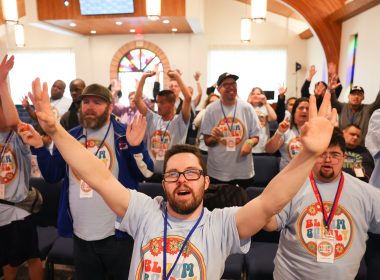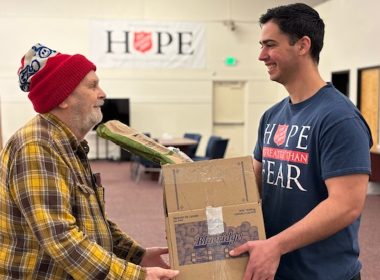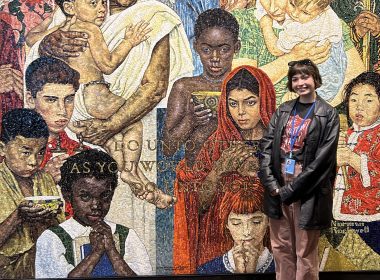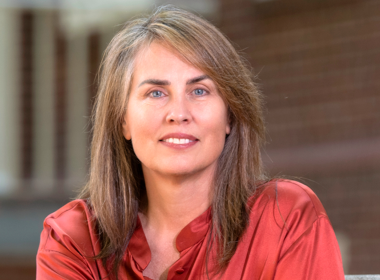by by Robert Docter –
With an Orlando, Florida “Magic Kingdom” backdrop approximately 700 delegates from across this nation and Canada examined multiple dimensions of the contemporary Salvation Army’s commitment to Booth’s theology of social redemption.
Echoing the title of General Frederick Coutts’ (R) book, Bread for My Neighbor, conference participants chose among 65 different workshop topics designed to explore current social issues reflected in this culture.
Commissioner Todd Bassett, national commander, was present for all of the sessions of the conference and stated the rationale of the theme in an open letter to the delegates. He wrote: “Our theme, ‘Bread for My Neighbor’ came from a quote by Nicolas Bardyear who stated: ‘Bread for myself is a material question, bread for my neighbor is a spiritual question’.”A series of pre-conference seminars led by Major David Dalberg, national disaster services coordinator, and Tom McSherry, the West’s emergency disaster services coordinator, focused on matters of disaster preparedness and response as President George W. Bush called the nation to war and National Social Services Secretary Lt. Colonel Paul Bollwahn called the Army to prayer.
Dozens of vendors, coordinated by Major John Jordan, presented resources and tools for implementation of our social ministry in the largest exhibit display in NSSC history.
Powerful plenary sessions
Between Saturday evening and Wednesday morning delegates assembled in some powerful plenary sessions. They began with the presentation by Com-missioner Philip Needham, Southern territorial commander, titled Our Holistic Mission: The Gospel Mandate. He took his listeners from the point of creation when God “into our nostrils breathed the breath of life and we became living beings” and went on to the tragedy of our Fall. Continuing the story takes us “through blotched pages of a people’s history and the botched lives of people with promise and brings us to the Redeemer who can make us whole.”
“So let’s get the story straight,” Needham continued. “God made us whole, but there’s an unwholeness about us that we call sin. God in Christ restores the wholeness. This means that he releases every part of our lives for health, and we set out on a journey to discover what wholeness means. We leave nothing about us untouched, because God said it was all good—and therefore not to be ignored!” He revealed an Army with an “all encompassing embrace—an ever widening circle, a down-to-earth sacrament, and a two way bridge with every soldier pursuing true holiness consisting of both piety and acts of mercy. Every soldier held accountable for acts of mercy. Every soldier crossing over the bridge to the neglected places, the forgotten people, the hurting world and offering the bread of the Kingdom—then inviting those reached back the other way to the banquet hall where there’s always a place at the table.
“That is the foundation of our holistic ministry,” Needham concluded.
At the Sunday morning worship service, along with music from the Sons of Salvation and Deanna and Jim Cheyne, Needham also presented an inspiring challenge based on the simple line in the Lord’s prayer – “Give us this day our daily bread …” – a seemingly small request locked in the middle of six powerful petitions.
Murdoch
The keynote session featured Dr. Norman Murdoch, professor of history at the University of Cincinnati. In a somewhat whimsical, sometimes hilarious, always confrontive, yet scrupulously honest style, this son of Salvation Army officer parents and author of the recent book Origins of The Salvation Army explored the intricacies and myths of Army history with both praise and criticism of some of its most revered ‘saints’.
“History,” Murdoch said, “begins with the question why?” He then examined a number of “why” questions with the audience—including the roots of Salvation Army social work. Murdoch stated convincingly that “the dream of Army social work came from the United States.”
He reminded the delegates that Major Frank Smith was sent to shepherd the Army in 1884 following the schism led by its second commissioner, Major Thomas Moore. While in the U.S. as its third commissioner, he met and was impressed with Henry George, an American socialist politician, and other contemporary social commentators along with a fellow officer, Major Suzie Swift. They influenced Smith’s thinking, and when he returned to England in 1887, he advocated a posture of social redemption to Booth. Booth appointed him as commissioner of the Army’s social work ministry, and according to Murdoch, he became the “ideological mover of the Darkest England scheme” along with Swift and Booth. Booth’s strength, Murdoch said, lay in the fact that he was a very secure individual and willing to use the ideas of others to further his own cause.
Gallet and Employment
A third general session was a delegate forum and featured a presentation by Wilma Gallet, executive director of the Army’s Employment Plus program in Australia. This presentation raised a number of issues to which a panel of representatives of each territory responded. The panel included Captain James Nauta, Central territory social services secretary; Major John Cheydleur, Eastern territory social services secretary; Lt. Colonel David Jeffrey, program secretary, Southern territory; Lt. Colonel Raymond Moulton, program secretary, Western territory; and Major Jean Moulton, social services secretary for Canada.
Dr. Robert Docter moderated the session that included Gallet’s presentation, comments by the panel and questions from the delegates.
Issues included the fit of such a program with the Army’s holistic mission, problems relating a national program through multiple territories, relationships with government, in-creased tendency toward privatization of government programs, and the seeming unwillingness of the Army culture to risk such a massive undertaking.
Gallet reported that Employment Plus is a state sponsored employment program based on a WorkNet model developed by a Western U.S. Salvationist, Deborah Angel. It includes pre-employment training, identification of a career ladder, career development and counseling, placement and follow-up service throughout all of Australia. It involves a massive government contract and coordination be-tween two Army territories along with the hiring, training, supervising, and administering of hundreds of employees in many locations. The Army won this bid over several for-profit companies and is now perceived as “the most successful agency in terms of achieving a roll over contract.”
The program has established five core values: integrity, justice, compassion, respect, and commitment.
Awards
The West was significantly honored as Bassett presented to Conrad Watson the Award for Excellence in Social Work.
Additionally, Bassett presented the National Social Services Award to the Oakland Adult Rehabilitation Center, administered by Major Bill and Laurie Heiselman.








